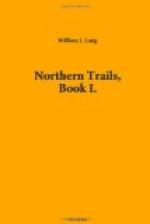At first old mother wolf showed them where to look, and when she had found a clutch of eggs would divide them fairly, keeping the hungry cubs in order at a little distance and bringing each one his share, which he ate without interference. Then when they understood the thing they scattered nimbly to hunt for themselves, and the real fun began.
Now a cub, poking his nose industriously into every cranny and under every thick bush, would find a great roll of down plucked from the mother bird’s breast, and scraping the top off carefully with his paw, would find five or six large pale-green eggs, which he gobbled down, shells, ducklings and all, before another cub should smell the good find and caper up to share it. Again he would be startled out of his wits as a large brown bird whirred and fluttered away from under his very nose. Sitting on his tail he would watch her with comical regret and longing till she tumbled into the tide and drifted swiftly away out of danger; then, remembering what he came for, he would turn and follow her trail back to the nest out of which she had stolen at his approach, and find the eggs all warm for his breakfast. And when he had eaten all he wanted he would take an egg in his mouth and run about uneasily here and there, like a dog with a bone when he thinks he is watched, till he had made a sad crisscross of his trail and found a spot where none could see him. There he would dig a hole and bury his egg and go back for more; and on his way would meet another cub running about with an egg in his mouth, looking for a spot where no one would notice him.
From mice and eggs the young cubs turned to rabbits and hares; and these were their staple food ever afterward when other game was scarce and the wood-mice were hidden deep under the winter snows, safe at last for a little season from all their enemies. Here for the first time the father wolf appeared, coming in quietly one late afternoon, as if he knew, as he probably did, just when he was needed. Beyond a glance he paid no attention whatever to the cubs, only taking his place opposite the mother as the wolves started abreast in a long line to beat the thicket.
By night the cubs had already caught several rabbits, snapping them up as they played heedlessly in the moonlight, just as they had done with the wood-mice. By day, however, the hunting was entirely different. Then the hares and rabbits are resting in their hidden forms under the ferns, or in a hollow between the roots of a brown stump. Like game birds, whether on the nest or sitting quiet in hiding, the rabbits give out far less scent at such times than when they are active; and the cubs, stealing through the dense cover like shadows in imitation of the old wolves, and always hunting upwind, would use their keen noses to locate Moktaques before alarming him. If a cub succeeded, and snapped up a rabbit before the surprised creature had time to gather headway, he dropped behind with his catch, while the rest went slowly, carefully, on through the cover. If he failed, as was generally the case at first, a curious bit of wolf intelligence and wolf training came out at once.




